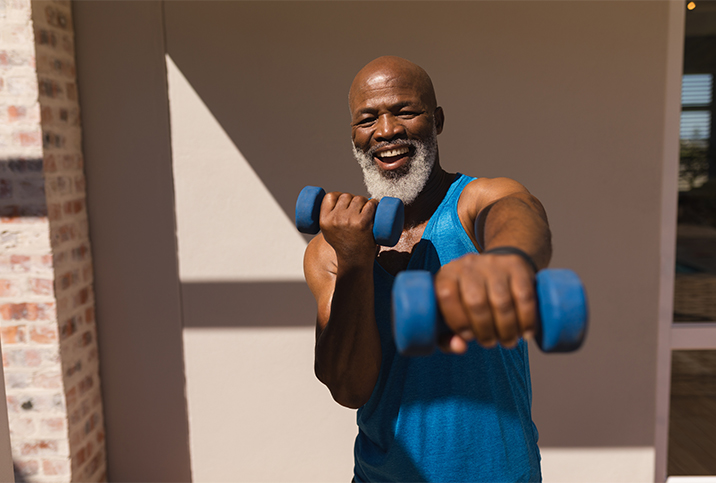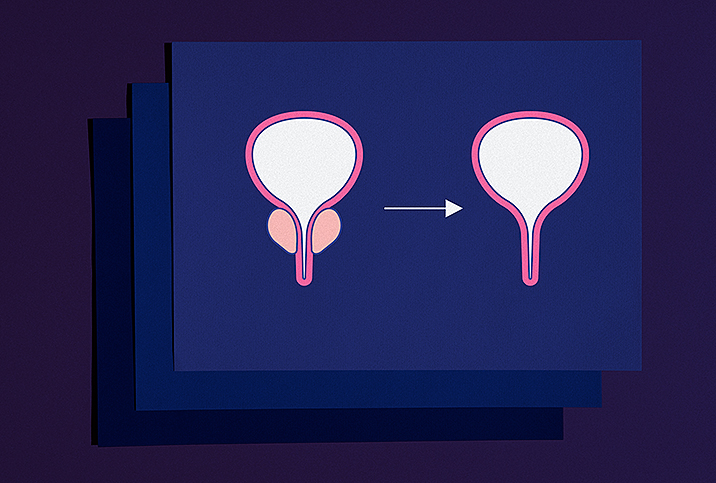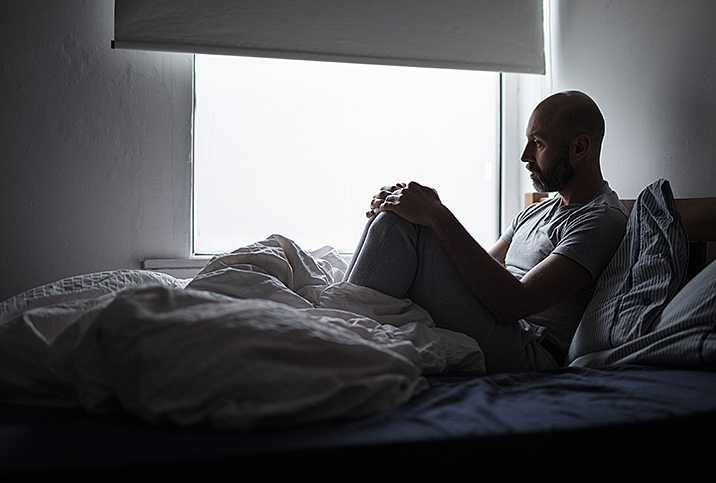Life After Prostate Cancer

Treatment for prostate cancer impacts life in ways that might be hard to imagine. You'll have strong emotions to navigate and will likely need to make lifestyle changes. Physical ones resulting from your prostate cancer will force you and your partner to adapt and adjust, and that can often be frustrating and difficult.
Despite these transformations, there is a vibrant life to be lived after prostate cancer treatment.
Overview of prostate cancer
The prostate, a small gland in front of your rectum and below your bladder, surrounding your urethra, is responsible for making semen. The seminal fluid helps sperm make their journey to your partner's fallopian tubes for impregnation.
As you age, your prostate will most likely enlarge: This is a non-cancerous condition called benign prostatic hyperplasia (BPH). If you have BPH, though, you do not have an increased risk of developing prostate cancer.
Prostate cancer develops from healthy prostate cells changing and growing rapidly into a tumor. Some prostate tumors are not cancerous, but many are. If cancerous cells are undetected while they're still confined to the prostate, they can spread to nearby organs and lymph nodes (regional spread) or organs in the upper part of your body, including the liver, lungs and brain, and your bones (distant spread).
If the growth of your prostate cancer cells is slow, you may never develop any symptoms. However, if you have a more aggressive growth of cancer cells in your prostate, they may produce several symptoms and cause problems as they grow and spread quickly.
A doctor often discovers the cancer during a prostate exam. The first part is a physical examination of your prostate. The second is a blood test to check your prostate-specific antigen (PSA) levels to see whether they are within the normal range (0 to 3 nanograms per milliliter).
If your blood test indicates PSA levels are high, your doctor will refer you to a urologist for further testing and analysis. At this point, to diagnose prostate cancer, a tissue biopsy of the prostate is carried out that is ultrasound-guided, specifically looking for tumors.
Your blood work will be graded by a pathologist, and if you have prostate cancer, you'll undergo either a CT scan or an MRI to check whether the cancer has spread beyond your prostate.
Your cancer will then be staged—stage 1 to stage 4 based on Gleason Score for prostate cancer—and the stage will determine treatment.
The emotional impact of prostate cancer
When you receive a diagnosis of prostate cancer, you will likely experience fear, shock, denial, anger and perhaps depression. As you begin to recover from prostate cancer, you will probably experience a similar range of emotions related to how your treatment affected you, especially physically and sexually.
For example, you may have lost the ability to get and maintain an erection, have less desire for or interest in sex and developed urinary continence. The emotional impact can be great as you cope with these changes.
One way to process and move through the emotional upheaval of prostate cancer is by seeking professional counseling. There may be local support groups in your area or one-on-one counselors who can help. Choose what is most comfortable for you.
If you have a nearby hospital dedicated solely to cancer care, you may be able to get counseling at no charge, along with other free services and resources. Talk with your cancer team to get a referral.
Lifestyle changes after prostate cancer
Expect lifestyle changes after prostate cancer. Some are easier to make than others, but you should also consider possible positive benefits.
You will need to see your doctor regularly—at least once a year—and the visit will include a prostate-specific antigen (PSA) blood test to make sure your PSA levels are remaining normal. If your prostate was not surgically removed, its current size and structure will be examined.
If you use tobacco of any kind, you will need to eliminate that after prostate cancer. There are smoking cessation products to help with cravings, but developing new routines and replacements for the physical sensations will be necessary. Ask your doctor for help.
There are no hard and fast rules with dietary changes after prostate cancer, but it wouldn't hurt to maintain a healthy diet, one with plenty of fresh or frozen vegetables, whole grains, lean meats and healthy fats, with little if any dairy products.
Another lifestyle change you may need to make is to establish a regular exercise routine if you don't already have one. A minimum of 150 minutes per week is recommended. One of the best ways to kick-start an exercise program is simply to walk outside for 30 minutes a day five days a week, and that'll also help lower your stress levels.
Sex after prostate cancer
One of the most common sexual side effects after prostate cancer is erectile dysfunction (ED).
Many medications are on the market for ED. Their primary function is to increase blood flow to your penis to enable you to get and maintain an erection for sex.
Another treatment method is a wearable constriction or vacuum device. Some medical-grade wearables such as Eddie by Giddy®are proven effective in maintaining erections, without the side effects of ED medications.
Surgical options are also available to help you with erectile dysfunction after prostate cancer, such as devices you can have surgically implanted in your penis to help you get and maintain an erection.
Whatever you decide about medicine, devices or surgery for your ED, there's no reason you and your partner cannot have sexual intimacy that's fulfilling.
The most important part of sex after prostate cancer is to be open and honest in communicating with your partner. Let your partner know what you are feeling and experiencing about sex after prostate cancer.
Sex has just as strong an emotional component as it does a physical one, so talking about your emotions about sex and, just as important, listening help establish understanding and greater intimacy in your relationship.
If you are an older man, sex may not be a big issue for you and your partner, because sex drive usually decreases as you age. If that is the case, you need to know there are ways both you and your partner can be sexually satisfied after prostate cancer.
Long-term care after prostate cancer
If your prostate cancer was localized, you have a five-year survival rate of almost 100 percent. Even if your prostate cancer was regional, your five-year survival rate is about 96 percent. For men with distant prostate cancer, the five-year survival drops to about 30 percent, according to the American Cancer Society.
If you have had prostate cancer and have successfully recovered, you have an increased risk of recurrence later in life.
You can proactively make sure any recurrence will be detected, diagnosed and treated early by keeping up with your annual appointments with your doctor and your urologist to detect any changes in your PSA levels.
However, even if you're proactive and the outlook is positive, you may experience feelings of dread that your prostate cancer could return. This can create mental health issues for you, your partner and even your family and friends.
If you are in a support group for prostate cancer survivors, you have a safe place to discuss your feelings and to benefit from the value of others' experiences—how they have coped and are coping now.
If you are inclined to write, consider starting a prostate cancer journal or online blog where you discuss all of the aspects you are dealing with after prostate cancer. Some people distill their thoughts and make sense of things through talking (processing out loud) while other people accomplish this through writing.
Either method is a good way to work through emotions and thoughts. Or perhaps you want to get adventurous and start a podcast, or maybe make short videos.
The medium you choose is secondary to your having a channel to get the thoughts out in the open. It doesn't matter if anyone ever reads or hears them but you, or whether a YouTube audience is on the edge of their seat waiting for your next episode. It's about you, it's about your processing your feelings, and it's about having a great life after prostate cancer.


















